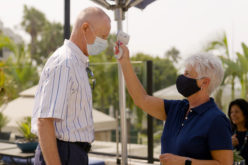For many parents to be, the imminent arrival of a little one means trying to squeeze in one last vacation before life changes forever, so you’ll inevitably find yourself asking the questions ‘can I travel while pregnant?’.
Babymoons have seen a huge rise in popularity in recent years, with many travel companies like Trafalgar Tours, even offering specialised babymoon tours.

But before you book your babymoon, family tour, business trip or any other type of travel, it’s important to ask the question ‘can I travel while pregnant?’. The good news is, for most expectant Mother’s the answer to this question is yes, as long as you are properly prepared, have had all the necessary vaccinations and are covered by travel insurance for any eventuality. We’ve rounded up some of the most common pregnancy and air travel questions below.
When can I travel while pregnant?
If you are having an uncomplicated pregnancy and are not at risk of pre-term labour, there is no reason why you cannot travel while pregnant. Some women prefer not to travel in the first 12 weeks of their pregnancy due to the common symptoms the first trimester brings – nausea and vomiting, and feeling very tired. The risk of miscarriage is also higher in the first 3 months whether you choose to travel or not, so some women would prefer to stay closer to home.
Many women asking can I travel while pregnant, find the best time to travel is mid-way through their pregnancy, between 4-6 months. During this period many women find they have more energy and the difficult symptoms from the first trimester have eased, meaning they are more likely to enjoy their vacation.
Whatever stage of pregnancy you are at, you should always bring your maternity medical records with you so any doctor you may have to see has all the relevant information to hand.

Can I travel at 36 weeks pregnant?
If you are wondering ‘can I travel at 7 months pregnant’ or ‘can I travel at 36 weeks pregnant’, it is important to remember that the chance of going into labour is naturally much higher after 37 weeks, or 32 weeks if you are carrying twins. Because of this, it is not advised to book air travel after the 36th week of pregnancy, and many airlines will not let you fly towards the end of your pregnancy. It may also be more difficult to get travel insurance in the latter stages of pregnancy. After week 28 of pregnancy, an airline may ask for a letter from your doctor or midwife confirming when your due date is, and that you are not at risk of pregnancy.
Aside from the risk of going into labour towards the end of your pregnancy, travelling in the final months of pregnancy can be both tiring and uncomfortable, due to the size of your growing bump!
Can I get travel insurance while pregnant?
Whether pregnant or not, you should always buy travel insurance for any trip you take. As for the question ‘can I get travel insurance while pregnant?’ the answer is yes, absolutely. Most insurers do not treat pregnancy as a medical condition, and many annual travel insurance policies cover pregnancy as standard. If you are covered by an annual travel policy, you should check with your provider in advance of your trip what pregnancy related cover is, and isn’t included. It is likely that your policy will cover you for complications associated with pregnancy and childbirth, but not for normal treatments or a normal birth.
If you do not have an annual travel insurance policy, you can purchase special pregnancy travel insurance that covers you for any pregnancy related medical attention you may need while abroad, including hospital bills should you go into early labour, or pregnancy complications.

Can I get travel vaccinations while pregnant?
When asking can I travel while pregnant, it’s important to weigh up the risks and this includes with vaccinations. Travel vaccines that use live bacteria or viruses are not recommended during pregnancy due to concerns that they could harm the baby. Vaccines that use a live version of the virus include oral polio, oral typhoid and yellow fever. However, some live vaccines may be necessary during pregnancy if the risk of infection outweighs the risk of the live vaccination. Generally, the best advice is to avoid visiting countries that require travel vaccinations while pregnant.
What are the risks of travelling while pregnant?
If you are enjoying a straightforward pregnancy, air travel is not harmful to you or your baby. There is no evidence to suggest that air pressure changes have a harmful effect on you or your baby, nor is there evidence that flying causes miscarriage, early labour or your waters to break. However, some women may experience some of the following while flying:
- Swelling in your legs due to water retention
- Nasal congestion and / or problems with your ears
- Sickness, especially if you are more prone to motion sickness
Pregnant women are also at higher risk of developing Deep vein thrombosis, or DVT, than those who are not pregnant, and this risk increases while flying due to sitting still for a prolonged length of time. Taking a short haul flight (less than four hours) decreases the risk of DVT, and if you are flying for longer than four hours there are a number of things you can do to minimise the risk, such as wearing loose fitting clothing, doing in seat exercises and drinking plenty of water.




